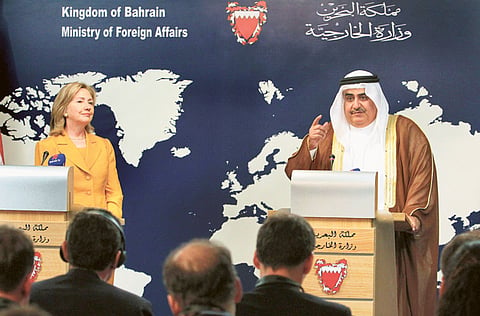Clinton reassures Gulf leaders ahead of Manama Dialogue
Leaders may be less forthcoming in future discussions

Manama: There is no cause for concern for relations between the Gulf states and the United States, US Secretary of State Hillary Clinton told a gathering of local and foreign press on the sidelines of the Manama Dialogue in Bahrain on Friday.
Her statements come after the fallout of the embarrassing WikiLeaks revelations which cast some Gulf leaders as proponents of using force against Iran to destroy its nuclear capabilities.
Analysts believe while the leaks will not likely drive a wedge between the Gulf and the West, Gulf leaders may be less forthcoming in future discussions with the US.
"In the absence of any credible alternative it seems probable that the Gulf states will continue to rely on the USA as their main security guarantor. They may however engage in a greater degree of hedging with Iran if they see no alternative," Nigel Inkster, Director of Transnational Threats and Political Risk at the IISS told Gulf News.
Dangers
Asked to comment about the content of the WikiLeaks, Bahrain Foreign Minister Shaikh Khalid Bin Ahmad Bin Mohammad Al Khalifa declined.
However, stating Bahrain's official policy he said, "Bahrain believes in every country's right to have peaceful nuclear programmes, but does not accept nuclear weapon programmes."
"There is international concern over a nuclear Iran. Everyone is aware of the dangers of nuclear proliferation in the region, especially Iran's neighbours," Clinton added.
"The Gulf states are undoubtedly and understandably worried about Iran's growing influence and hegemonic ambitions within the region," Inkster said.
Clinton, meanwhile, said that US concerns over Tehran's suspected atomic weapons programme are shared by Iran's neighbours, just as people in northeast Asia are worried about North Korea's activities.
"There is no debate in the international community, and perhaps the Iranians will engage seriously ... on what is a concern shared by nations on every continent, but most particularly right here in the region," Clinton said about talks due to start between major powers and Iran on Monday.
"Because obviously if you're the neighbour of a country that is pursuing nuclear weapons, that is viewed in a much more threatening way than if you're a concerned country many thousands of miles away. But the concern is the same and we hope that Iran will respond."
Neighbours concerned
She added that "just as the neighbours in this region are very focused on Iran's pursuit of nuclear weapons, neighbours of northeast Asia are equally concerned about what North Korea is doing."
On the stalled Middle East peace talks, Clinton said Washington is working "intensively" to break the Israel-Palestinian impasse, steering clear of Palestinian reports that US efforts have failed.
"The United States is working intensively to create the conditions that will permit the parties to negotiate their way forward to a final resolution," Clinton said.
"We are working very hard to do that, and the United States is prepared to play a very active role but ultimately... only the parties can make these hard decisions," she said.
"We're not in any way discouraged."
She said Washington and Manama had a "shared goal of a two-state solution and a comprehensive peace in the Middle East" that would see an independent Palestinian state living alongside a secure Israel.
For weeks, the United States has been trying to convince Israeli Prime Minister Benjamin Netanyahu to impose a new moratorium on colony construction in the occupied West Bank.
Direct negotiations
A ten-month freeze expired on September 26, shortly after the launch of new peace talks between Israel and the Palestinians, the first direct negotiations between the two sides in nearly two years.
The talks ground to a halt after the ban expired and colony building resumed in the Palestinian territory.
— With inputs from agencies
Sign up for the Daily Briefing
Get the latest news and updates straight to your inbox



